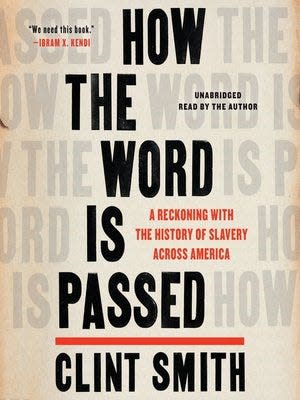Book Look: 'How the Word is Passed' dives into the reality of American history, slavery
- Oops!Something went wrong.Please try again later.
- Oops!Something went wrong.Please try again later.

I have spent hundreds of hours during my life wondering why people believe what they do.
Is it because we do not know the facts? Is it because there are no facts from the past from which we can learn? Or is it because persuasive adults have buried the truth in lies?
Clint Smith also has many of the same "wonders," but he narrowed them down to a manageable subject in his book, "How the Word Is Passed: A Reckoning with the History of Slavery Across America."
Throughout his life, Smith wondered why we have so many versions of the history of slavery in the United States. Shucks, we have wildly disparate reasons why we fought the Civil War. Is it because we lack facts upon which to render judgment?
Smith, a Black man, invented an ingenious method to investigate the multiple versions of American history on the subject of slavery. He visited several major historical sites. He took all of the tours, sometimes more than once. And he listened to the tour guides explain Thomas Jefferson, his plantations, his slaves, his diverse contributions to the founding of the United States, what happened to Jefferson's slaves when he died, and, of course, Sally Hemings.
He listened to the questions asked by members of the audience, noted where the visitors were from and often interviewed them at length.
No matter which historic site or the ethnicity of the audience, Americans on the tours were factually all over the place. Frequently, tourists from other countries appeared to know more about American slavery than American residents.

In the case of Jefferson, almost everyone knew he had slaves, but most thought he gave them up when we became a nation. The truth is that nearly all of Jefferson's enslaved workers, about 200 people at the time of his death, were auctioned off in 1826 to pay for his debts. Both northerners and southerners were in relatively equal factual error on these facts.
Most people had heard of Sally Hemings, but the tour guides noted that some people were astonished to hear that Jefferson had a Black mistress that bore him children. And many people refused to believe it, even though DNA tests conducted in 1998 have proven it. Some people wanted to ensure that such degrading information was never taught in school.
Another one of the historical sites visited was the Whitney Plantation in Louisiana. This plantation is infamous for its compulsory reproduction techniques. Some reading this review might well remember the explosive content of books like "Mandingo" when they hit the newsstands in the 1960s.
Also, the Whitney Plantation had huge burial grounds that supplied northern universities, like Harvard and Yale, with corpses for dissecting in their medical labs. Thus, these northern universities, professing to be anti-slavery, were anxious to accept the results of slavery.
One of the most consistent beliefs that emerged from people on the tours was the hope that the slaves were well treated, as if that would somehow make slavery acceptable.
Most people that Smith encountered in his two-year study did not realize that many northerners had slaves when the country was founded, although the numbers declined rapidly after 1800. However, slaves who escaped to northern cities would find gangs in place to capture and return them to their southern-state masters. For a price, of course.
Another subject that surfaced repeatedly was why the Civil War was fought. Most northerners asserted that the war was fought over the issues of slavery, while southerners were more likely to favor state's rights or the Lost Cause theory in which the cause of the Confederate States was heroic and not centered on slavery.
At the end of the book, Smith writes, "The history of slavery is the history of the United States. It was not peripheral to our founding; it was central to it. It is not irrelevant in our contemporary society. It created it. The history is in our soil, it is in our policies, and it must, too, be in our memories."
Matthew Desmond, Pulitzer Prize-winning author of "Evicted," offered a strong endorsement of the book: "A work of moral force and humility 'How the Word is Passed' offers a compelling account of history and memory of slavery in America. Writing from Confederate Army cemeteries, former plantations, modern-day prisons, and other historical sites, Clint Smith moves seamlessly between past and present, revealing how slavery is remembered and misremembered and why it matters..."
"How the Word is Passed" by Clint Smith, Little Brown, 2021, 336 pages, $29.
Donus Roberts is a former teacher, an avid reader/collector of books, owner of ddrbooks, and he encourages readers to connect at ddrbooks@wat.midco.net.
This article originally appeared on Watertown Public Opinion: 'How the Word is Passed' explores slavery and how it shaped America

